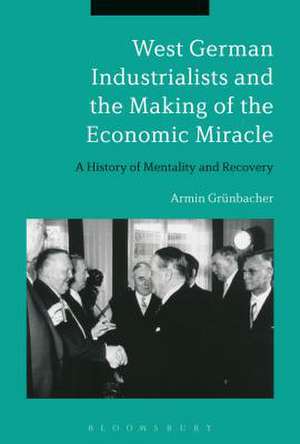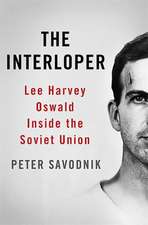West German Industrialists and the Making of the Economic Miracle: A History of Mentality and Recovery
Autor Dr Armin Grünbacheren Limba Engleză Paperback – 6 feb 2019
| Toate formatele și edițiile | Preț | Express |
|---|---|---|
| Paperback (1) | 230.15 lei 6-8 săpt. | |
| Bloomsbury Publishing – 6 feb 2019 | 230.15 lei 6-8 săpt. | |
| Hardback (1) | 773.23 lei 6-8 săpt. | |
| Bloomsbury Publishing – 12 iul 2017 | 773.23 lei 6-8 săpt. |
Preț: 230.15 lei
Preț vechi: 296.75 lei
-22% Nou
Puncte Express: 345
Preț estimativ în valută:
44.05€ • 45.81$ • 36.36£
44.05€ • 45.81$ • 36.36£
Carte tipărită la comandă
Livrare economică 14-28 aprilie
Preluare comenzi: 021 569.72.76
Specificații
ISBN-13: 9781472965370
ISBN-10: 147296537X
Pagini: 224
Ilustrații: 9 bw illus
Dimensiuni: 156 x 234 mm
Greutate: 0.31 kg
Editura: Bloomsbury Publishing
Colecția Bloomsbury Academic
Locul publicării:London, United Kingdom
ISBN-10: 147296537X
Pagini: 224
Ilustrații: 9 bw illus
Dimensiuni: 156 x 234 mm
Greutate: 0.31 kg
Editura: Bloomsbury Publishing
Colecția Bloomsbury Academic
Locul publicării:London, United Kingdom
Caracteristici
Explores the changing perception of German industrialists from war criminals to captains of industry
Notă biografică
Armin Grünbacher is Senior Lecturer in Modern History at the University of Birmingham, UK.
Cuprins
List of IllustrationsList of TablesAcknowledgementsList of AbbreviationsIntroductionPart I: From War Criminals to Captains of IndustryChapter 1: The 'Missing Link': The Role of Chambers of Industry and Commerce for Entrepreneurial Self-perception in the Immediate Post-war PeriodChapter 2: Ways of Redemption: Public Relations, the IHG and the DIIPart II: The Miracle Makers: Industrialists and their Self-perception in the 'Economic Miracle' PeriodChapter 3: The New 'Entrepreneur'Chapter 4: 'Americanization'? Leadership Recruitment and TrainingChapter 5: Bürgerlichkeit: Culture and Honour, Upstarts and Old ElitesChapter 6: Politics: Business, Association and the StatePart III: BusinessChapter 7: Living with the 'Enemy': Trade Unions, Worker representation and CommunistsChapter 8: Osthandel: Trading with the 'Enemy'ConclusionBibliographyIndex
Recenzii
Well grounded in the relevant literature and in archival research, Grünbacher's study is informative and persuasive . Specialists will find the book rewarding.
Grünbacher has written a very accessible and concise study on a fascinating topic, which does much to explain the status of West German businessmen. It is highly recommended to anyone interested in early post-war German economic and societal history, and those who want to gain a clearer insight into the Federal Republic's Wirtschaftswunder.
The book shows a masterful grasp of German archival material and academic literature, particularly beneficial for experts who do not know German . Grünbacher has produced a significant book on the history of entrepreneurs' mentality during the West German economic miracle that will be a very useful resource for scholars and postgraduate students interested in the economic and political history of Germany.
This is a deeply researched study that skillfully combines economic, social, and political history. By revealing how business leaders after Nazism cast themselves as a new elite - one that embodied honor, loyalty, and the entrepreneurial spirit - Grünbacher offers a useful synthesis of current research trends, as well as an original focus on the mentalities of those who took credit for West Germany's "economic miracle."
Who was responsible for the West German 'Economic Miracle' after the Second World War? German managers and industrialists at the time have take credit, and many scholars have agreed. But, as Armin Grünbacher demonstrates in this impressively researched book, their role in the 'Economic Miracle' was more complex, involving a mixture of opportunism; adaption to new realities in the international political economy; and stubborn resistance to them by adhering to long established traditions, practices and mentalities.
This is a thorough, comprehensive and intelligent study of how West German industrialists re-positioned themselves after the disaster of 1945. A significant contribution to our understanding of West German society in the 1950s and 1960s.
Grünbacher has written a very accessible and concise study on a fascinating topic, which does much to explain the status of West German businessmen. It is highly recommended to anyone interested in early post-war German economic and societal history, and those who want to gain a clearer insight into the Federal Republic's Wirtschaftswunder.
The book shows a masterful grasp of German archival material and academic literature, particularly beneficial for experts who do not know German . Grünbacher has produced a significant book on the history of entrepreneurs' mentality during the West German economic miracle that will be a very useful resource for scholars and postgraduate students interested in the economic and political history of Germany.
This is a deeply researched study that skillfully combines economic, social, and political history. By revealing how business leaders after Nazism cast themselves as a new elite - one that embodied honor, loyalty, and the entrepreneurial spirit - Grünbacher offers a useful synthesis of current research trends, as well as an original focus on the mentalities of those who took credit for West Germany's "economic miracle."
Who was responsible for the West German 'Economic Miracle' after the Second World War? German managers and industrialists at the time have take credit, and many scholars have agreed. But, as Armin Grünbacher demonstrates in this impressively researched book, their role in the 'Economic Miracle' was more complex, involving a mixture of opportunism; adaption to new realities in the international political economy; and stubborn resistance to them by adhering to long established traditions, practices and mentalities.
This is a thorough, comprehensive and intelligent study of how West German industrialists re-positioned themselves after the disaster of 1945. A significant contribution to our understanding of West German society in the 1950s and 1960s.








